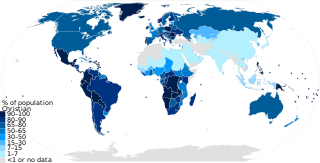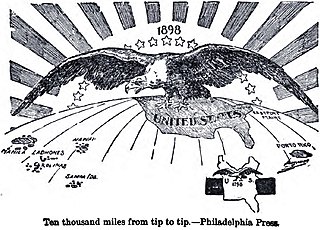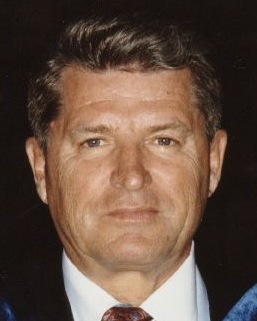
Christendom historically refers to the Christian states, Christian empires, Christian-majority countries and the countries in which Christianity dominates, prevails, or that it is culturally or historically intertwined with.
Pax Americana is a term applied to the concept of relative peace in the Western Hemisphere and later in the world after the end of World War II in 1945, when the United States became the world's dominant economic, cultural, and military power.

The Bush Doctrine refers to multiple interrelated foreign policy principles of the 43rd President of the United States, George W. Bush. These principles include unilateralism, preemptive war, and regime change.
The Project for the New American Century (PNAC) was a neoconservative think tank based in Washington, D.C., that focused on United States foreign policy. It was established as a non-profit educational organization in 1997, and founded by William Kristol and Robert Kagan. PNAC's stated goal was "to promote American global leadership". The organization stated that "American leadership is good both for America and for the world", and sought to build support for "a Reaganite policy of military strength and moral clarity".

American imperialism is the expansion of American political, economic, cultural, media, and military influence beyond the boundaries of the United States. Depending on the commentator, it may include imperialism through outright military conquest; gunboat diplomacy; unequal treaties; subsidization of preferred factions; regime change; or economic penetration through private companies, potentially followed by diplomatic or forceful intervention when those interests are threatened.
Neoconservatism is a political movement that began in the United States and the United Kingdom during the 1960s during the Vietnam War among foreign policy hawks who became disenchanted with the increasingly pacifist Democratic Party and with the growing New Left and counterculture of the 1960s, particularly the Vietnam protests. Neoconservatives typically advocate the unilateral promotion of democracy and interventionism in international affairs, grounded in a militaristic and realist philosophy of "peace through strength." They are known for espousing disdain for communism and political radicalism.
A United States presidential doctrine comprises the key goals, attitudes, or stances for United States foreign affairs outlined by a president. Most presidential doctrines are related to the Cold War. Though many U.S. presidents had themes related to their handling of foreign policy, the term doctrine generally applies to presidents such as James Monroe, Harry S. Truman, Richard Nixon, Jimmy Carter and Ronald Reagan, all of whom had doctrines which more completely characterized their foreign policy.

Hegemony or Survival: America's Quest for Global Dominance is a book about the United States and its foreign policy written by American political activist and linguist Noam Chomsky. It was first published in the United States in November 2003 by Metropolitan Books and then in the United Kingdom by Penguin Books.

The Middle East, also known as the Near East, is home to one of the Cradles of Civilization and has seen many of the world's oldest cultures and civilizations. The region's history started from the earliest human settlements and continues through several major pre- and post-Islamic Empires to today's nation-states of the Middle East.

A religious war or a war of religion, sometimes also known as a holy war, is a war which is primarily caused or justified by differences in religion and beliefs. In the modern period, there are frequent debates over the extent to which religious, economic, ethnic or other aspects of a conflict are predominant in a given war. The degree to which a war may be considered religious depends on many underlying questions, such as the definition of religion, the definition of 'religious war', and the applicability of religion to war as opposed to other possible factors. Answers to these questions heavily influence conclusions on how prevalent religious wars have been as opposed to other types of wars.
Criticism of the war on terror addresses the morals, ethics, efficiency, economics, as well as other issues surrounding the war on terror. It also touches upon criticism against the phrase itself, which was branded as a misnomer. The notion of a "war" against "terrorism" has proven highly contentious, with critics charging that participating governments exploited it to pursue long-standing policy/military objectives, reduce civil liberties, and infringe upon human rights. It is argued by critics that the term war is not appropriate in this context, since there is no identifiable enemy and that it is unlikely international terrorism can be brought to an end by military means.
Blowback is the unintended consequences and unwanted side-effects of a covert operation. To the civilians suffering the blowback of covert operations, the effect typically manifests itself as "random" acts of political violence without a discernible, direct cause; because the public—in whose name the intelligence agency acted—are unaware of the effected secret attacks that provoked revenge (counter-attack) against them.

Robert David Kaplan is an American author. His books are on politics, primarily foreign affairs, and travel. His work over three decades has appeared in The Atlantic, The Washington Post, The New York Times, The New Republic, The National Interest, Foreign Affairs and The Wall Street Journal, among other publications.

Andrew J. Bacevich Jr. is an American historian specializing in international relations, security studies, American foreign policy, and American diplomatic and military history. He is a Professor Emeritus of International Relations and History at the Boston University Frederick S. Pardee School of Global Studies. He is also a retired career officer in the Armor Branch of the United States Army, retiring with the rank of colonel. He is a former director of Boston University's Center for International Relations, now part of the Pardee School of Global Studies. Bacevich is the co-founder and president of the Quincy Institute for Responsible Statecraft.
"Islamofascism", first coined as "Islamic fascism" in 1933, is a term popularized in the 1990s drawing an analogical comparison between the ideological characteristics of specific Islamist or Islamic fundamentalist movements and short-lived European fascist movements of the early 20th century, neo-fascist movements, or totalitarianism.

Rodrigue Tremblay is a Canadian economist, humanist and political figure. He is an emeritus professor of economics at the Université de Montréal. He specializes in macroeconomics, international trade and finance, and public finance. He is the author of books in economics and politics. Tremblay's documents and archives are kept at the Center of Archives of the Quebec National Library and Archives, in Montreal, Quebec.

United States foreign policy in the Middle East has its roots in the early 19th-century Tripolitan War that occurred shortly after the 1776 establishment of the United States as an independent sovereign state, but became much more expansive in the aftermath of World War II. With the goal of preventing the Soviet Union from gaining influence in the region during the Cold War, American foreign policy saw the deliverance of extensive support in various forms to anti-communist and anti-Soviet regimes; among the top priorities for the U.S. with regards to this goal was its support for the State of Israel against its Soviet-backed neighbouring Arab countries during the peak of the Arab–Israeli conflict. The U.S. also came to replace the United Kingdom as the main security patron for Saudi Arabia as well as the other Arab states of the Persian Gulf in the 1960s and 1970s in order to ensure, among other goals, a stable flow of oil from the Persian Gulf. As of 2023, the U.S. has diplomatic relations with every country in the Middle East except for Iran, with whom relations were severed after the 1979 Islamic Revolution, and Syria, with whom relations were suspended in 2012 following the outbreak of the Syrian Civil War.

Criticism of United States foreign policy encompasses a wide range of opinions and views on failures and shortcoming of United States foreign policy and actions. Some Americans view the country as qualitatively different from other nations and believe it cannot be judged by the same standards as other countries; this belief is sometimes termed American exceptionalism. This belief was particularly prevalent in the 20th century. It has become less dominant in the 21st century as the country has become more divided politically and has made highly controversial foreign policy decisions such as the Iraq War. Nevertheless, America is an extremely powerful country from an economic, military and political point-of-view, and it has sometimes disregarded international norms, rules and laws in its foreign policy.

The Western world, also known as the West, primarily refers to various nations and states in the regions of Australasia, Western Europe, and Northern America; with some debate as to whether Eastern Europe and Latin America also constitute the West. The Western world likewise is called the Occident in contrast to the Eastern world known as the Orient. The West is considered an evolving concept; made up of cultural, political, and economic synergy among diverse groups of people, and not a rigid region with fixed borders and members. Definitions of "Western world" vary according to context and perspectives.

Imperial Ambitions: Conversations with Noam Chomsky on the Post-9/11 World is a 2005 Metropolitan Books American Empire Project publication of interviews with American linguist and political activist Noam Chomsky conducted and edited by award-winning journalist David Barsamian of Alternative Radio.












